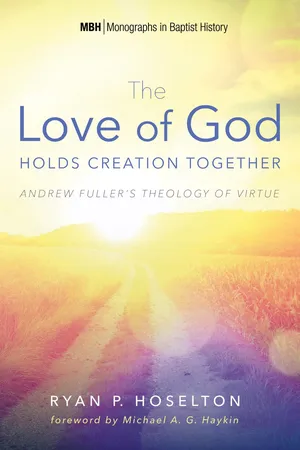![]()
1
Introduction
The rise in attention to Andrew Fuller (1754–1815) is long overdue. In the early nineteenth century, the historian Joseph Ivimey (1773–1834) envisioned that Fuller would “be remembered with esteem and veneration by all who feel an interest for the salvation of the heathen and the prosperity of the denomination.” Recent scholarly and ministerial initiatives have labored to bring Ivimey’s desire to fruition. According to Michael Haykin, the Director of the Andrew Fuller Center for Baptist Studies, interest in Fuller’s life and thought is “currently undergoing a small renaissance.” Historians and theologians alike are rediscovering Fuller’s role in shaping not only Baptist identity but also transatlantic Evangelicalism, while many pastors are commending Fuller as an example for ministers today.
Most treatments of Fuller’s life and thought have underlined his Evangelical Calvinist soteriology and missiology. Fuller’s articulation of Evangelical Calvinism perceived a direct relationship between God’s sovereignty and evangelistic tenacity, laying the ideological framework for the modern missionary movement. Without question, Fuller’s advocacy of Evangelical Calvinist thought and practice—which eventually became known as Fullerism—remains his greatest contribution to the early Evangelical movement. Peter Morden’s intellectual biography of Fuller represents how most historians and pastors have perceived him: the quintessential Evangelical. Morden presents Fuller through the grid of David Bebbington’s well-known quadrilateral of Evangelical identity: conversionism, activism, biblicism, and crucicentrism. According to Bebbington, Fuller based his Evangelical Calvinism on Jonathan Edwards’s Enlightenment reinterpretation of the relationship between God’s sovereignty and human responsibility as “an expression of the law of cause and effect.” Therefore, deduces Bebbington, Fuller’s reliance on Edwards “was sufficient to ensure” that the Evangelical movement was “built on Enlightenment foundations.”
This book focuses on an area of Fuller’s thought that directly undermined Enlightenment foundations: ethics. Fuller countered the verdict of many Enlightenment thinkers that traditional Christian belief was deleterious to moral excellence. He defended the veracity of censured orthodox doctrines—such as the Trinity, the atonement, human depravity, and the truth of Scripture—on the basis that they were conducive to virtue, human flourishing, and happiness. His apologetic method perpetuated a treasured idea of pre-modern theologians like Augustine of Hippo (354–430) and John Calvin (1509–1564)—that the truth and essence of orthodoxy consists not merely in its factuality but also its goodness. Like many of the classic theologians, Fuller rooted morality in right Christian doctrine. A right knowledge of God and human nature grounded a correct knowledge of virtue, and a vital love of God and neighbor facilitated a love of virtue. Thus, Fuller’s Evangelical Calvinism shaped more than his zealous conversionism; it provided the foundation and motivation of virtue and determined humanity’s moral telos.
Extremely helpful in examining Fuller’s theology of virtue is a work by Ellen Charry on virtue and theology. Her interpretation of the motive behind classic theologians through the centuries, who guarded and promoted Christian orthodoxy because it facilitated virtue and human excellence, applies aptly to Andrew Fuller. Charry offers the neologism “aretegenic” to capture the “virtue-shaping function of the divine pedagogy of theological treatises.” The adjective “aretegenic” (“aretology” in its nominal form) is a compound of the Greek terms, aretē, denoting “virtue,” and gennaō, “to beget.” The classic theologians believed that an accurate knowledge of God was aretegenic—it fostered virtue and excellence in the lives of believers. Examining theological texts spanning from the New Testament to the Reformation, Charry’s project aims at “reclaiming a genuine pastoral Christian psychology that grounds human excellence in knowing and loving God.” This book seeks to contribute to this objective by studying the aretegenic theology of Andrew Fuller’s Evangelical Calvinism.
Fuller developed his theology of goodness most extensively in his polemical works against Socinianism, The Calvinistic and Socinian Systems Examined and Compared, as to Their Moral Tendency (1793, 1802), and Deism, The Gospel Its Own Witness (1800). Thus, the material from these treatises will furnish most of the body of this book. He composed these works in response to the writings of Joseph Priestley (1733–1804) and Thomas Paine (1737–1809), two of the most widely known eighteenth-century critics of orthodox belief. Although Priestley and Paine were very different figures in many respects, they both rested a substantial portion of their diatribe against orthodoxy on the basis of its inherent proclivity to immorality—a contention that Fuller deemed unfounded.
Chapter 2 focuses on the formation of Fuller’s Evangelical Calvinist thought early in his ministry career and the role it played in establishing his theology of virtue. Also, while a thorough treatment of Fuller’s Enlightenment context is not within the bounds of this book, a brief analysis of its moral philosophy, as well as the views of Priestley and Paine, is necessary in order to understand Fuller’s attempt to challenge its moral foundations. His understanding of humanity’s moral inability contrasted sharply with the modernist anthropology, necessitating Evangelical truth to return men and women from their moral rebellion against God. Chapter 3 introduces the background and design of his polemical works against Socinianism and Deism. This chapter shows how Fuller’s understanding of Christian orthodoxy as aretegenic grounded his apology in both debates. Chapter 4 presents a systematic analysis of how Fuller’s Evangelical Calvinist doctrine provided the framework for his theology of virtue. Fuller aimed to re-enchant moral reasoning by situating it in a cosmic theological drama in which the righteous and loving Moral Governor provides a way to pardon immoral rebels. Chapter 5 examines how, according to Fuller, Evangelical Calvinist doctrine motivates virtue, love, and happ...
